We live in a civilisation haunted by doubt and by hyperskepticism. One, where skepticism is deemed a virtue, inviting hyper forms in as champions of intellect. The result has gradually led to selective hyperskepticism that often uncritically takes the word of champions or publicists for Big-S Science, while doubting well founded but unfashionable analyses or even self-evident truths.
H’mm, just in case someone is unclear about or doubts that Self-Evident Truths exist, here is one . . . with an extra one for good measure:
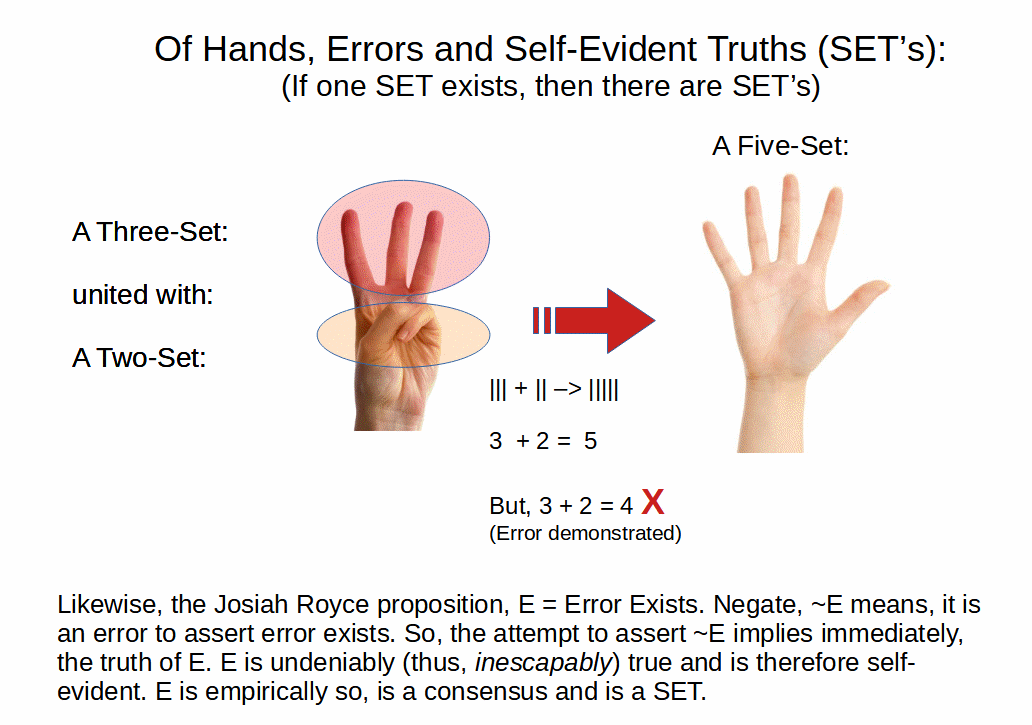
(Of course, I also have argued that there are self-evident truths regarding duty; particularly, inescapable first duties of reason that actually govern responsible reason, argument and discussion, starting with duties to truth, right reason, warrant and wider prudence, etc. Thus, that there are MORAL SETs. For, example, not even the most ardent objector can avoid appealing to these principles to try to give his arguments rhetorical/persuasive traction. Inescapable, so true and self-evident. I just note that for the moment.)
How, then, can we exorcise the ghosts of acid doubt and restore a better balance regarding knowledge claims?
I think, Thomas Reid and other champions of “[refined] common sense” have some sound counsel. That is, I wish to champion a principle of responsible, common sense guided credulity:
PRINCIPLE OF “MODERATE” CREDULITY: It makes good sense to accept that our conscious self-awareness, sense of rational, responsible freedom (with first duties of reason) — “common sense,” so-called, and sense of being embodied as creatures in an objectively real physical world are generally warranted though they may err or have limitations or oddities in detail
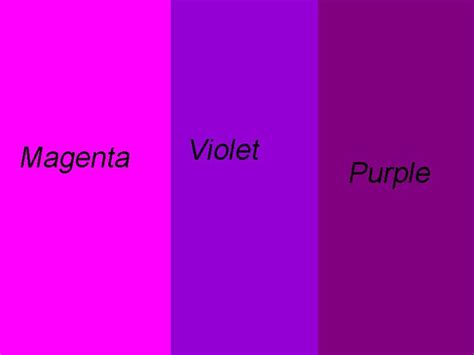
A case in point helps to clarify. Here, colour vision. There are two related but somehow distinct colours, violet and purple. The former is spectral [i.e. a “pure” colour coming from certain wavelengths of light], the latter is not. [Generally, purple is seen as a mix of red and blue, e.g. the Line of Purples on the CIE tongue of colour framework.] Why, then, the similarity, despite the difference?
The answer turns out to depend on our colour sensors and onward processing in our eyes and visual system. Simplifying, it turns out that our Red response system has a secondary peak towards the high frequency end of the visible spectrum, near Blue:
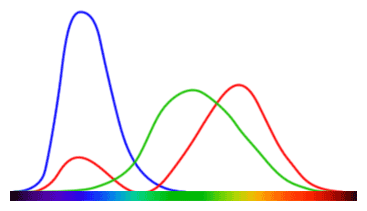
The result is that at the Blue, short wavelength end, we distinguish Blue-Green [e.g. Cyan], Blue, Indigo [cf. dark Blue Jeans], Violet. And the relationship with Purple becomes obvious, Purple superposes Red and Blue colours, which is typically going to be significantly redder than Violet.
So, we see here how our perception of colours is shaped by our embodiment and specifics of our bodily tissues and cells, but corresponds to objective phenomena. Indeed, the colour screen you are most likely using to view this on, works by superposing tiny pixels with Red, Green and Blue. If you were to print off on a modern colour printer, it will most likely blend dots of Cyan, Magenta, Yellow and Black, with the paper providing White.
I add, on metamerism, so we can see how two closely similar colours can be composed in quite distinct ways:

There is no good reason to airily sweep such away as being beyond some ugly, impassable gulch between what we can access internally through consciousness and a dubious external world of appearances. That is why we can take the principle that yes, we may err on particular points or details but on the whole there is no good reason to dismiss our conscious awareness — we symbolise C:( ) — and what it immediately presents, the self [= I] embedded in the world [We].
Let us symbolise:
C:(I UNION We)
So, we notice that it is our consciousness that carries everything else and instantly presents us with our sense of ourselves embedded in the world beyond our bodies. Our bodies, of course, are part of the physical world. Where, our reasonings are part of that self-awareness and are inextricably entangled with perceptions and language describing what we are aware of and perceive. The union is used as our bodies are embedded in the world and we are somehow present within it.
I have often pointed to Eng Derek Smith’s two-tier controller, cybernetic loop model as a context for discussing how that can be, esp. with quantum influence:
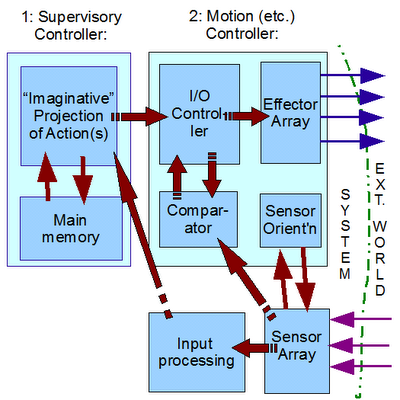
In this light, the Plato’s Cave type shadow-show world of grand doubts or delusions can be set aside as self-defeating:
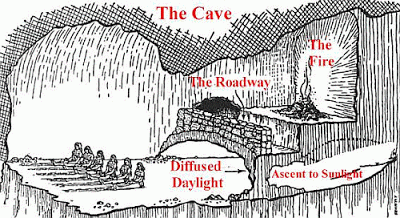
For, there is no natural firewall, so to give a general challenge to our consciousness, self awareness, sense of the self or perception of the world is to undermine the whole process. That is as opposed to having errors in detail or to recognising processes and limitations of sensing, neural network computation etc and the quantum physical substructure associated with that awareness. As, Violet vs Purple indicates.
In short, the point is to recognise limitations without falling into hyperskepticism or reductionism. This is of course a part of the old philosophical problem of the one and the many. In a sense, there is nothing new under the Sun.
In this context, I find Michael Davidson helpful as he discusses what he terms Reid’s Razor, in effect a manifesto of defeasible but heuristically generally effective common good sense reasoning:
[Reidian Common good sense as definition and razor, 1785:] “that degree of judgement which is common to men with whom we can converse and transact business”
Davidson shrewdly points out, how the Razor shaves:
Take a philosophical or scientific principle that is being applied to a particular situation: ask yourself whether you would be able to converse rationally and transact business with that person assuming that principle governed the situation or persons involved. If not dismiss the principle as erroneous or at least deeply suspicious. For example, suppose someone proposes that things-as-they-appear-to-be are not things-as-they-really-are. I do not think I would buy a used car from this man.
That seems a fair enough test of habitual adherence to first duties of reason — or otherwise. Y’know: to truth, right reason, prudence, sound conscience, neighbour, fairness and justice, etc.
In that context, he abstracts from Thomas Reid, a list of defeatable, default rules of thumb for credulity vs skepticism:
REID’S RULES OF COMMON SENSE REALISM
1) Everything of which I am conscious really exists [–> at minimum as an object of conscious awareness, and often as a particular or abstract entity, the presumption is, if I perceive a world with entities, it is by and large real]
2) The thoughts of which I am conscious are the thoughts of a being which I call myself, my mind, my person.
3) Events that I clearly remember really did happen.
4) Our personal identity and continued existence extends as far back in time as we remember anything clearly.
5) Those things that we clearly perceive by our senses really exist and really are what we perceive them to be.
6) We have some power over our actions and over the decisions of our will.
7) The natural faculties by which we distinguish truth from error are not deceptive.
8) There is life and thought in our fellow-men with whom we converse.
9) Certain features of the face, tones of voice, and physical gestures indicate certain thoughts and dispositions of mind.
10) A certain respect should be accorded to human testimony in matters of fact, and even to human authority in matters of opinion.
11) For many outcomes that will depend on the will of man, there is a self-evident probability, greater or less according to circumstances.
12) In the phenomena of Nature, what happens will probably be like what has happened in similar circumstances.
Davidson comments:
According to Reid, anyone who doubts these principles will be incapable of rational discourse and those philosophers who profess to doubt them cannot do so sincerely and consistently. Each of these principles, if denied, can be turned back on the denier. For example, although it is not possible to justify the validity of memory (3) without reference to premises that rest on memory, to dispense with memory as usually unreliable is just not philosophically possible. Reid qualifies some of these principles as not applying in all cases, or as the assumptions that we presume to hold when we converse, which may be contradicted by subsequent experience. For instance with regard to (10) Reid believes that most men are more apt to over-rate testimony and authority than to under-rate them; which suggests to Reid that this principle retains some force even when it could be replaced by reasoning.
I endorse Reid’s principles as normally true and what we must assume to be true to engage in argument and discussion. But, as Reid acknowledges, not all may be true all the time. I thus see Reid’s principles as epistemological rather than metaphysical. Psychologists might point to such things as optical illusions, false memory, attentional blink, hallucinations and various other interesting phenomena which might throw some doubt over some of Reid’s assertions. But these are nonessential modifiers that if entertained as falsifications of these principles would lead to the collapse of all knowledge. Very few philosophers have not acknowledged that the senses can deceive us or that reason is fallible, but to say the senses consistently deceive or that reason is impotent is too big a sacrifice. That the senses can deceive and reason is fallible is good reason to be cautious in our conclusions but not a good reason to dispense with observation and reason all together.
That seems to me to be a useful backgrounder and 101, if not quite a Manifesto. I think it deserves a place in the ongoing UD series on Logic and First Principles of Reason. END
PS: It seems helpful to append on how on Opponent Processes, sensors and signal processing can use LMS sensors to generate four colour channels — Red, Yellow, Green, Blue — via suitably scaled subtraction:
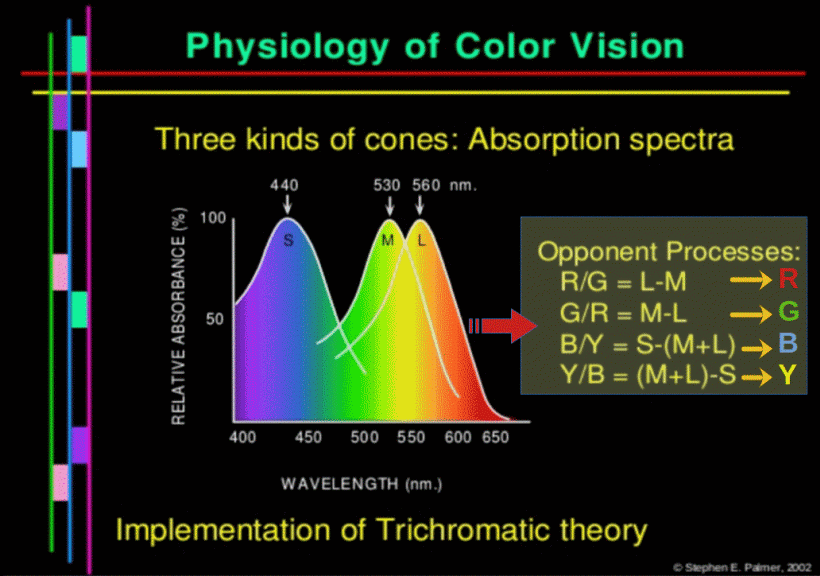
Thus, we can see economising of types of sensors, enhancing resolution by keeping effective pixels in only three types and gaining enhanced colour sensitivity.
U/D Apr 17: For completeness, I add a view of the Munsell, colour spindle type colour model with gradation from Black to White as level, hue on a wheel model and saturation as a radius vector:

Where, we may envision one branch, at the hue that involves the classic artist’s earth pigment colour, Yellow-Ochre:
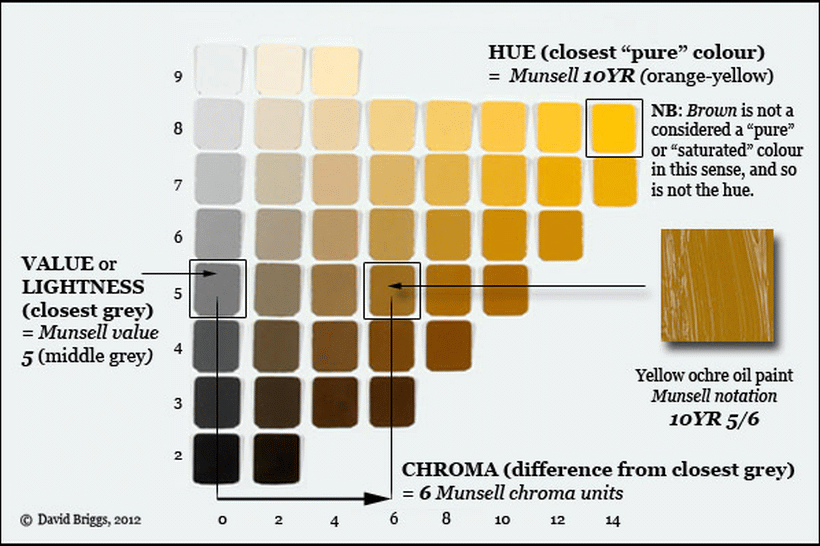
Further to such, observe the classic 1931 CIE tongue of colour model, with the line of purples bridging blue/violet and red along the spectrum locus arc, also with various colour gamuts for display or printing systems marked:
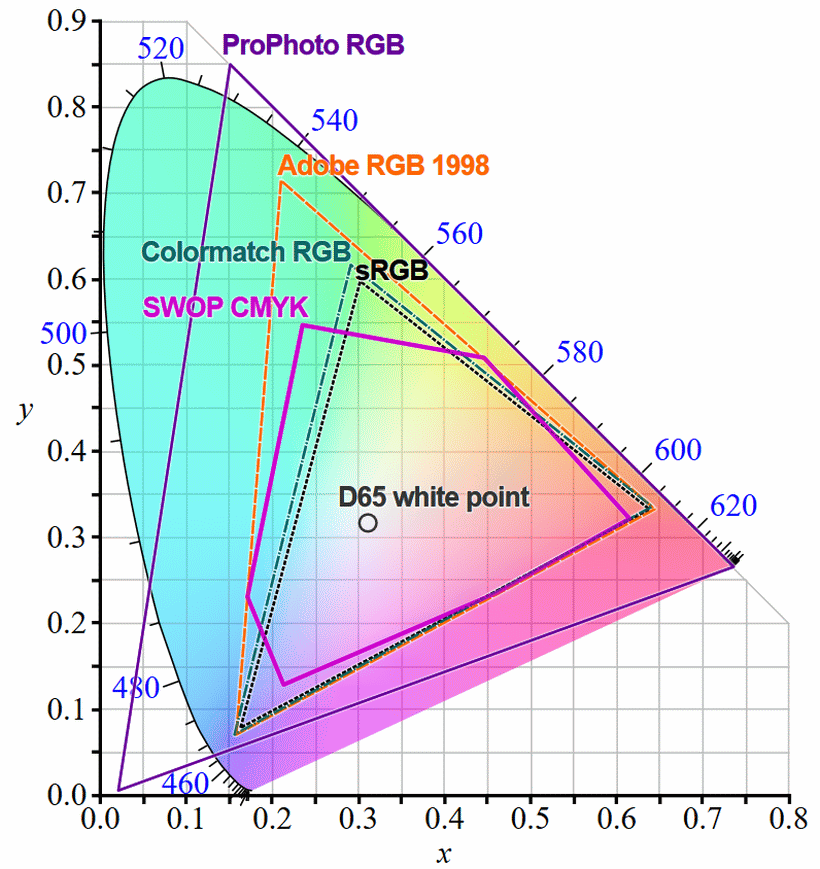
Such an approach, further allows us to understand how the visual system, with limitations and possibilities for error, exhibits high quality design giving us a veridical perception of an important dimension of the world, colours tied to chemical composition, chemical-physical interactions and linked quantum processes in a key octave of the electromagnetic spectrum associated with energy transitions of 1.65 – 3.10 eV, a bit short of the damaging actinic range starting with UV. Illustrating:
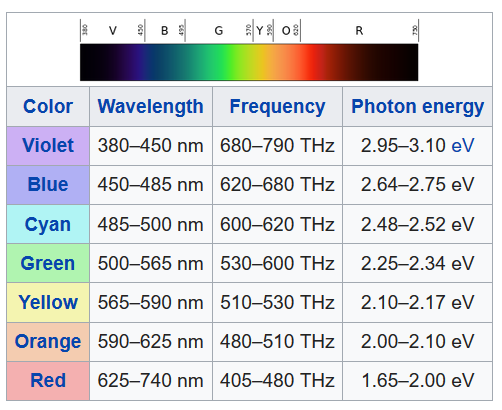
It seems further advisable to provide an overview of the visual system:
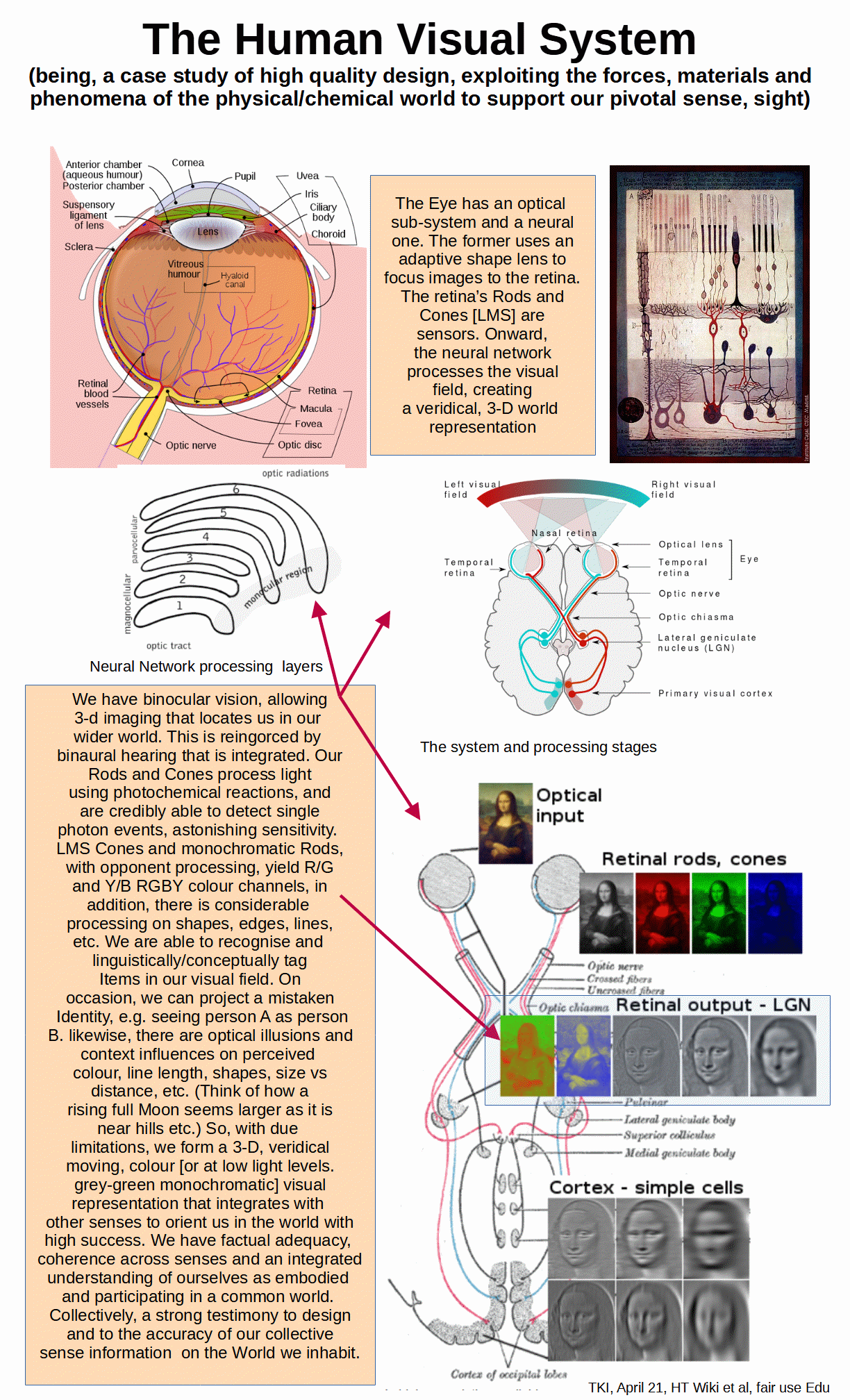
Such then allows us to use Reidian Common Sense to find safe sailing between the Charybdis of poor design fallacies and the Scylla of imagining ourselves into grand doubt/grand delusion on alleged ugly gulches regarding ourselves as conscious, minded, conscience guided, responsible, rational significantly free creatures credibly embodied and participating in a common physical world. (See here on the Mythological reference.)
